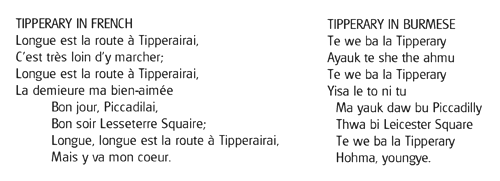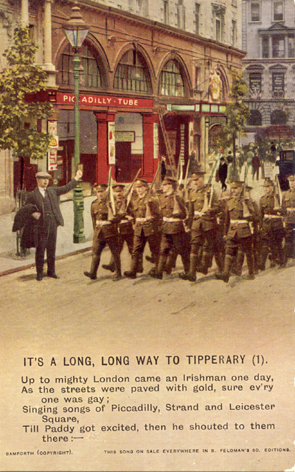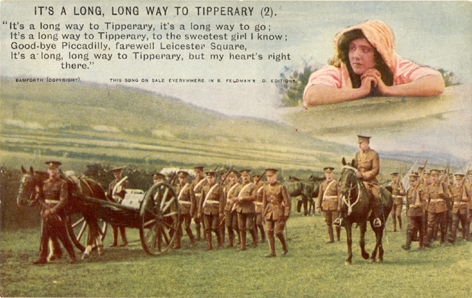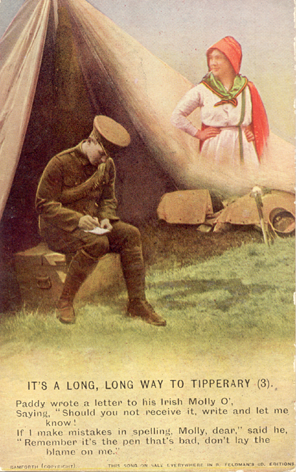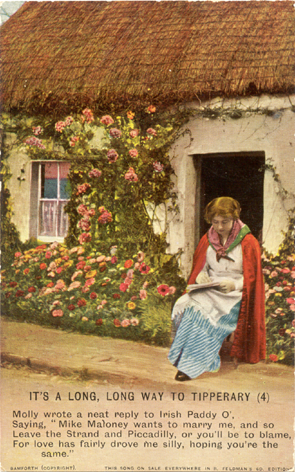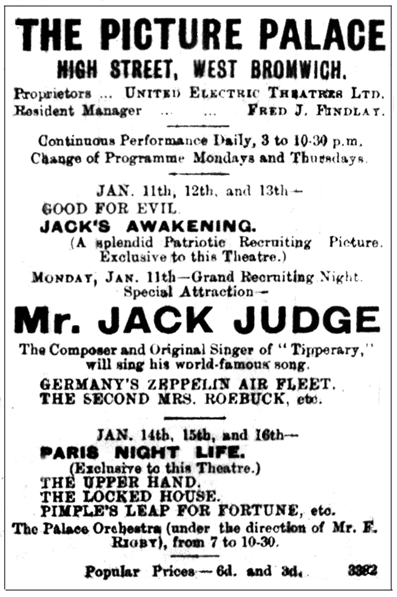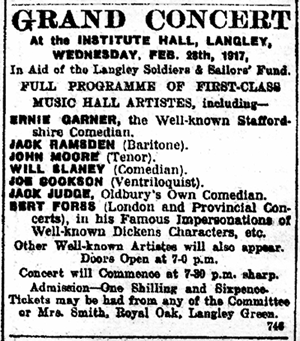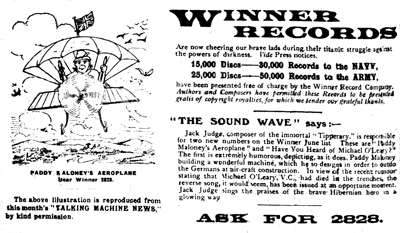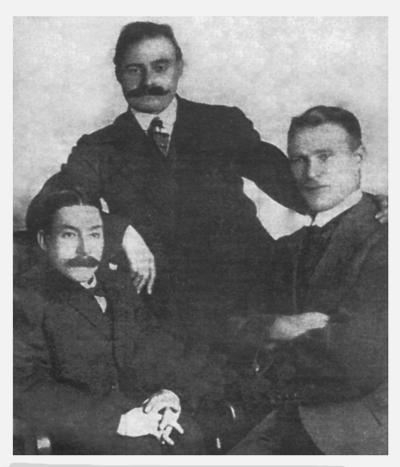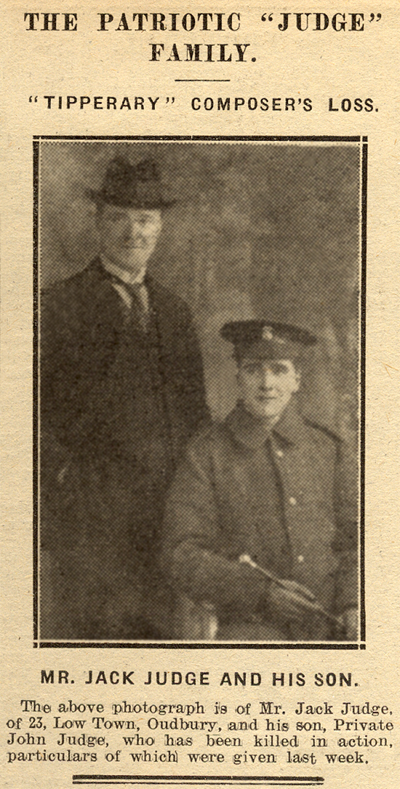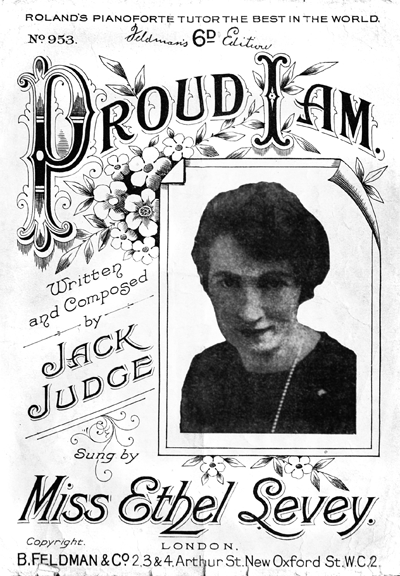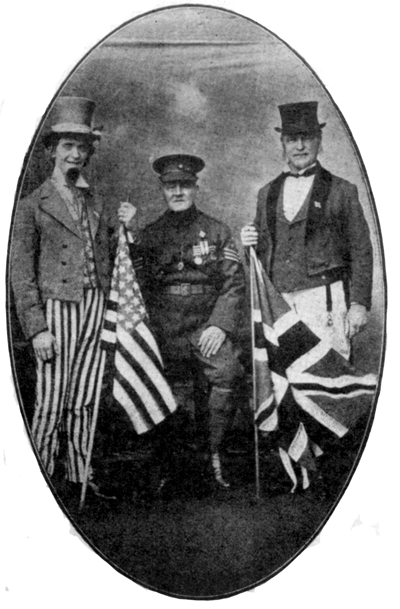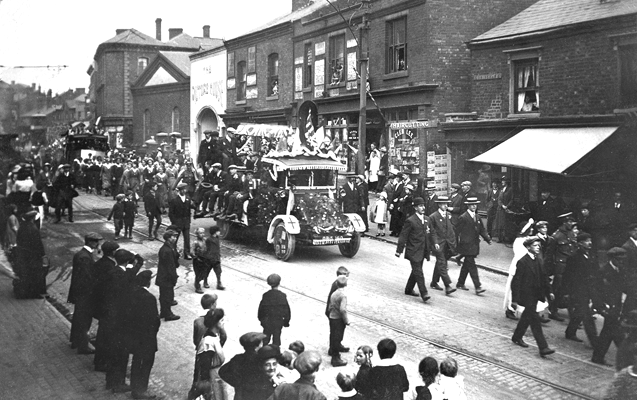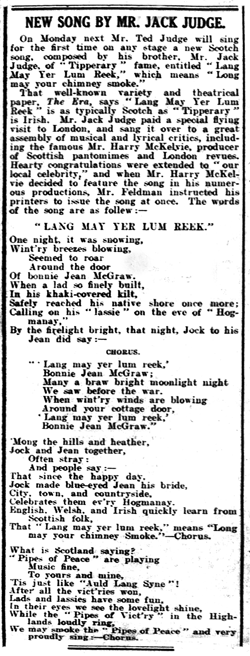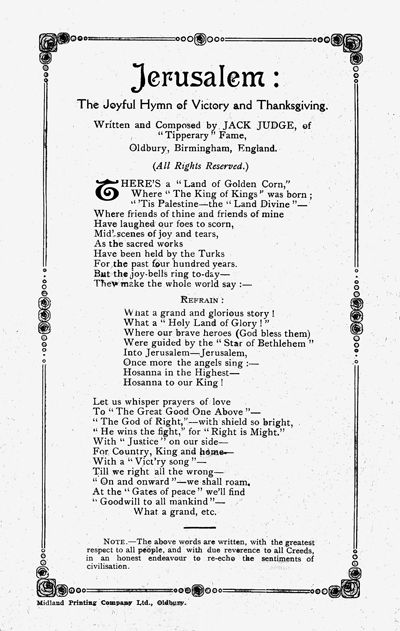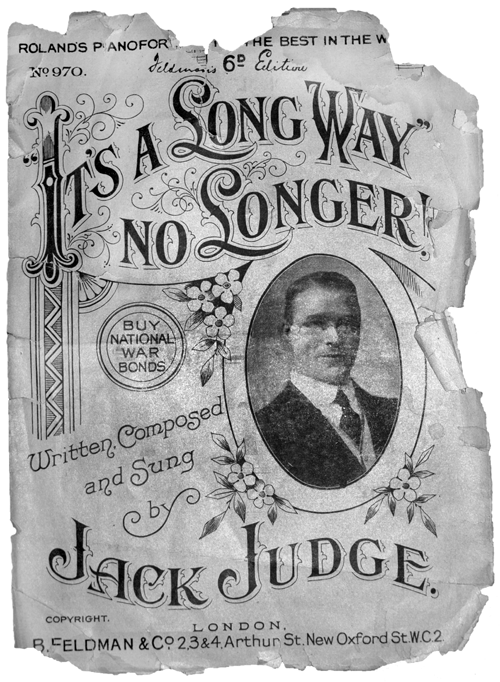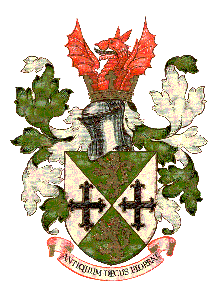
|
History
of Oldbury, Langley and Warley
|
||
|
Communities
of the West Midlands
|
||
|
The
website of Langley Local History Society - Oldbury Local History
Group - Old Warley Local History Society
|
||
 |
||
| HOME | |
| NEWS & EVENTS | |
| HISTORY SOCIETIES | |
| PUBLICATIONS | |
| GALLERY | |
| QUESTIONS | |
|
article 008 - Part 2 JACK JUDGE - HIS LIFE AND MUSIC
|
|
PART
TWO - WAR AND PEACE
|
||||||||||||||||||||||||||||||||||||||||||||||
|
Jack Judge 1872 - 1938
War The Great War started on 4th August 1914 with a declaration of war on Germany by Britain. No one realised how long the war would last or how it would touch the life of everyone in the country, but it would bring both fame and sorrow for Jack. When the British Expeditionary Forces arrived at Boulogne at the start of the war, they were watched by a reporter from the Daily Mail. The Connaught Rangers were part of the force, and marched down the gangway singing a song he had not heard before. It was 'It's a long, long way to Tipperary'. He commented on this in his article, and included lines from the song. The song was immediately taken up by the other army units, and in demand by civilians. The demand for sheet music suddenly grew, Jack was famous, and even more music halls wanted him. He was 42 years old! Within a few months, the song had spread world-wide, and had been translated into dozens of languages. This song is not, in itself, patriotic in any way, but is a simple humorous tale about an Irish lad, who has gone to London, writing to his sweetheart in Ireland. Nevertheless, it had become indelibly linked with the First World War, because it had an infectious tune, was good to march to, and marked 'allegro con spirito', 'fast with spirit', just what the army needed!
Jack was patriotic, an admirer of King and country. He continued to perform around the country, raising its morale. Increasingly, he was drawn into recruiting events and fund-raising to help those returning home wounded, or families facing hard times because the bread-winner was at the front or lost. He supported the local groups raising money to send comforts to the soldiers and sailors, appeared in countless concerts for them, and started the 'Tipperary Concert Party' to perform at these events.
Jack did write and perform popular openly-patriotic songs during the war, such as 'We're All under the Same Old Flag'.Two songs had a distinctly Irish theme: 'Michael O'Leary, V.C.', about the first Irishman to win the Victoria Cross in the war, and another about a wonderful aeroplane, 'Paddy Maloney's Aeroplane'. He recorded both of these for Winner records in 1915.
All of the songs at that Jack wrote up to 1917 bore the name of Harry Williams as well as Jack's, and Bert Feldman continued to publish them. The picture shows the three men, Harry William on the left, Bert Feldman in the centre and Jack at the right.
Jack's eldest son, John, reached eighteen years of age in 1915, and immediately volunteered for the 8th Royal Welsh fusiliers. Jack's brothers, Will and Jimmy, were also serving. In 1916, the desperate need for soldiers at the front led to the introduction of conscription, and then to the raising of the upper age for military service to 46. Jack was 44, and, therefore, liable to be conscripted. However, he appeared before the military tribunal for Oldbury, arguing that he could do more for the war effort by continuing to raise the spirits of the nation and carry out his charitable work, rather than joining the army. The tribunal agreed, and granted him exemption, provided he continued in this work.
However, the war was to bring him a bitter blow in February 1917, when his son, John, was killed in Mesopotamia at the age of 20. The Welsh Fusiliers were cut down by shells and machine gun fire as they attacked the Turks at Dahra Bend, and the body of Pte John Judge was never identified. He is commemorated on the memorial at Basra. Jack and the family were shocked, but he put his personal pain aside to continue his charitable work. John Judge had started to write songs himself, and had sent one home from the army, 'Everybody's Proud of Their Own'. After John's death, Jack polished the song up, started singing it, and published it in their joint names.
One of Jack's songs that proved popular was 'Proud I Am', published in 1918 and sung by Ethel Levey according to the sheet music. Ted Judge also sang it, and it was played by Joe Loss and his orchestra. It was re-issued in 1941 during the second world war.
Just six months after Jackie's death, Jack was heavily involved in one of the largest fund-raising events of the war in Oldbury, a great carnival in September 1917. The aim was to raise as much money as possible for local soldiers and sailors and their families. It included a huge procession round the borough, visiting Langley and Warley as well as Oldbury town. The floats and walkers covered all aspects of the war: nurses, returned soldiers, munitions workers, as well as the uniformed organisations, local industry, and churches. The great procession was headed by Jack Judge, Ted Judge and Fred Skipp, who was had been a professional soldier in the nineteenth century and now kept the 'Bustle House' in Birmingham Street. Jack Judge was dressed as 'John Bull', Ted Judge as 'Uncle Sam', and Fred Skipp in uniform and medals, represented old soldiers. The weather was so bad on the planned carnival day that it had to be postponed, but when it was finally held a week later, it was a great success.
Peacetime The war finally finished in November 1918, and Jack could turn his attention to peacetime. His immediate reaction was the song, 'Jerusalem: The Joyful Hymn of Victory and Thanksgiving', which was written "with the greatest respect to all people, and with due reverence to all Creeds, in an honest endeavour to re-echo the sentiments of Civilisation". In a very different peace song noted in November 1918 by the 'Oldbury Weekly News', which printed the words in full. This was a Scottish song about Jock returning from the war in his 'khaki-covered kilt' to marry his blue-eyed bonnie Jean McGraw. It was called 'Lang May Yer Lum Reek', which, as the second verse tells us, means 'long may your chimney smoke'. The 'Pipes of Peace are playing in the Highlands' in the third verse.
Jack returned to his music hall career, and was again away from Jinny and the family for long periods of time. His songs were more light-hearted and upbeat in mood now, including, 'It's a Long Way no Longer' and 'Its no use Worrying over Yesterday' (both 1918), and 'Where the Apple Blossom Grows' (1919). The Oldbury Weekly News regularly reported new songs by Jack; in many instances, the songs have not survived, and there is no other record of him writing them.
Jack's concern for the treatment of the returning soldiers grew, and he still worked on their behalf. His dismay at their treatment was summed up in a 1920 song 'Where is Peaceland?' It was never published because Bert Feldman considered it too subversive. It was quite unlike anything else that Jack wrote: gone was the humour, in came the anger at the situations the 'returning heroes' had to face. Each verse starts, "Discontented Tommy - discontented Jack". The first verse continues,
Jack sang it at a concert in September 1920 at the Brown Lion in Oldbury, where it was well received by an audience that contained many discontented Tommies and Jacks. However, it was only performed locally. By the end of the war, Benjamin Williams had moved from the Malt Shovel to The Plough Inn at Mere Green, Warwickshire, which now has been renamed 'The Tipperary'. Harry had gone with him, and died there in 1924. Harry's name did not appear on any of Jack's new compositions after 1917. The Williams family started to make claims that Harry was a song-writer, who had written 'Tipperary', and that this had been 'stolen' by Jack. This seems implausible since there is no evidence that Harry had written any solo songs, or had any solo item published. In both its theme and its structure, 'Tipperary' is typical of the work that Jack was producing before 1910 and after his collaboration with Harry had ceased. It has the 'Jack Judge stamp' on it. Nevertheless, the controversy over the writing of 'Tipperary' did not go away. Jack's songs and verses can never be described as great literature. However, they did capture the spirit of the time and the tradition of the music hall, generally being catchy, fast, amusing and easy to sing. Just what the marching soldiers and the music hall audiences wanted.
Sources The information in this article has been taken from 'Jack Judge, the Tipperary Man' by Verna Hale Gibbons, from articles by Leslie Frost in the Oldbury Weekly News in 1962, from contemporary newspaper articles, from Gillian Nicklin (Jack's only great-granddaughter), from research and family papers of the Stanley family (descendants of Jack's sister, Jane Ann), and from personal research. Dates of births, marriages and deaths have been taken from these sources and the birth, marriage and death indices available online at freebmd.rootsweb.com, and from the on-line databases of ancestry.co.uk and familysearch.org.
Text and family tree in this format: © Dr Terry Daniels, 2011 Pictures and illustrations: © Various, as stated in captions Contact for permission to reproduce
If you have objects, photographs, records or other items associated with Jack Judge, please contact this website, since the local history societies of Oldbury are building up as complete an archive on Jack Judge as possible, and would like to add copies of anyitems to it. We are particularly interested in copying recordings of Jack's music.
|
||||||||||||||||||||||||||||||||||||||||||||||
